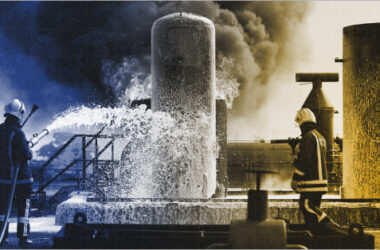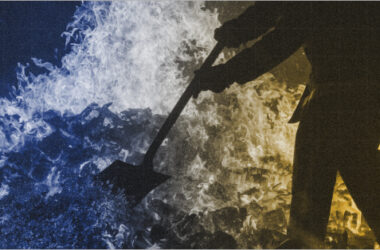One of the most crucial property protection insurance that homeowners, shop owners, and businesses need is fire insurance. It protects against financial damages due to unexpected fire events. However, here is one thing that most policyholders are unaware of- fire insurance does not only cover fire-related losses. It often includes protection against other perils such as explosions, storms, and a crucial one: RSMD.
If you have ever read your Fire Insurance Policy document and wondered what “RSMD” stands for, you are not alone. It is a little abbreviation with a lot of significance. It provides a necessary protection that may spell the difference especially during turbulent times. Let’s unpack the meaning of RSMD, what it entails and why it is a crucial part of your Fire Insurance cover.
RSMD Meaning in Fire Insurance
RSMD is an abbreviation for Riot, Strike and Malicious Damage. It is a significant extension that comes with the Standard Fire and Special Perils Policy (SFSP) that is prevalent in India. This provision extends the limits of a fire insurance policy, which includes the damage on property that has been caused by civil unrest, labor strike, or intentional vandalism.
To put it in simpler words, where standard Fire Insurance covers you in case of accidental fire or lightning, the RSMD clause covers you in case of man-made incidents that can cause equally devastating damages.
This coverage came into the picture in response to the increasing threat of social and industrial unrest so that policyholders will not be financially doomed in the event that these unforeseen circumstances lead to the destruction of their properties.
Components of the Fire Insurance RSMD Cover
In order to fully understand the RSMD cover in Fire Insurance, we must first divide it into its three major components; Riot, Strike and Malicious Damage. These are considered different categories of risks. But, they are bundled together since they often seem to overlap in reality.
1. Riot
A riot is a situation where a group of individuals is involved in an act of violence or illegitimate acts leading to destruction of a property, which can be either public or privately owned. Such acts are normally instigated by civil unrest, protests, or civil disturbance.
Direct losses or damages as a result of rioting mobs are subject to the RSMD clause. This could include:
- Destruction of a shop window in a protest that went violent.
- Cars or houses that are vandalized during public demonstrations
To give you an illustration, when a mob destroys your retail store during a political rally, your RSMD cover will save you-but only to the extent that the riot was not caused by an excluded peril such as war or terrorism.
2. Strike
A strike can be defined as a labor stoppage or an action by employees. Though strikes are usually not violent, in some cases, they grow out of control resulting in property destruction, either deliberately or unintentionally.
The RSMD coverage in Fire Insurance indemnifies physical damage by strikers or those involved in labor-related protests. Examples may include:
- Equipment in a factory that was destroyed by laborers in an industrial dispute
- Office premises destroyed in a workers’ agitation.
Such situations are not rare in large industrial areas, and therefore, RSMD coverage protection is very important to manufacturers and entrepreneurs.
3. Malicious Damage
Malicious damage is a deliberate act that persons or groups may undertake to damage or destroy property without any lawful justification. It covers losses due to vandalism, sabotage, or intentional damages by the third party.
Some examples may include:
- An individual who intentionally burns down a warehouse because of personal revenge.
- Damaged interiors or broken glass panels by an intruder with malicious intent
This section of the RSMD cover guarantees that in case any damage happens either knowingly or intentionally, your policy will provide you with financial assistance during the repair or replacement of the damaged properties.
RSMD Clause under Standard Fire and Special Perils Policy
In India, the Standard Fire and Special Perils Policy (SFSP)—regulated by the Insurance Regulatory and Development Authority of India (IRDAI)—serves as the baseline structure for most fire insurance products. The RSMD clause forms one of its most important extensions.
Under this clause, insurers agree to indemnify the insured against direct loss or damage to property caused by:
- Riot or civil commotion
- Strike-related violence
- A destruction that is either malicious or deliberate.
However, the policy covers only physical damage to an insured property, but not business interruption or indirect losses -unless those are added with separate endorsements such as Business Interruption Insurance.
Here is Example:
Think of a commercial property with a fire insurance policy with the RSMD extension in which the building is insured for ₹2 crore. In the event that the property experiences₹20 lakh of damage at the hands of rioters during a demonstration, the insurer will cover that loss. This will enable the owner to regain some of the loss, without depleting their savings.
Exclusions in Fire Insurance RSMD Coverage
While RSMD cover is extensive, not all types of disturbances or intentional acts are covered by it. Certain circumstances are not considered in order to avoid confusion with other specialized policies or to prevent mis-use.
Some significant coverage exclusions may include:
- War, Civil War, or Invasion:
Any loss caused by the acts of war or civil commotion that can be considered as an event of popular uprising, rebellion, or insurrection is not covered. - Damage Related to Terrorism:
RSMD cover does not cover damage as a consequence of terrorism acts, which are covered under a separate Terrorism Risk Insurance Policy. - Confiscation by Authorities:
Any damage or loss due to seizure, confiscation, or requisition by the Government or a law enforcement agency is not included. - Nuclear or Radioactive Damage:
Any loss that may occur due to nuclear reactions or radioactive contamination is not covered. - Consequential Loss:
RSMD is limited to direct physical damage, which does not include loss of earnings or time loss that may occur after the event.
Policyholders should also ensure that they read the policy wordings word-by-word, to know what is covered and what will not be covered under RSMD. These details enable one to know what to expect during the filing of claims.
Significance of RSMD Coverage in Fire Insurance
A standard fire insurance policy is substantially enhanced with the RSMD clause. In an uncertain world where social and industrial unrest are more likely to trigger unpredictable changes, this coverage can be the difference between recovery and ruin. Here are some pointers in this regard-
1. Financial Protection from Man-Made Disasters
Fire insurance without RSMD includes accidental fires only. On the other hand, RSMD makes sure that damages caused by human-inflicted anarchy are also compensated.
2. Critical for Businesses and Industries
RSMD is crucial to factories, retail outlets and warehouses. Industrial disputes or public protests can easily cause damage worth lakhs. This provision will give the insured company the much-needed financial assurance to resume operations.
3. Increasing Relevance in Modern Times
Urban India has seen rising instances of public disturbances and demonstrations. The National Crime Records Bureau (NCRB) reported over 13,000 cases of riots and similar incidents in recent years. This makes RSMD protection more relevant than ever for property owners in densely populated areas.
4. Affordable Add-On for Greater Security
Adding RSMD coverage doesn’t significantly raise your premium but greatly enhances your protection. It’s a cost-effective way to safeguard valuable property assets from unpredictable human actions.
Examples to Illustrate RSMD Claims
To understand the practical value of RSMD cover, let’s look at a few real-world situations:
Scenario 1 – Riot Damage:
A commercial market with a retail store is vandalized in a general protest around the city. The crowd smashes windows, destroys shelves, and steals products. The total loss amounts to ₹8 lakh. Since the owner has a Fire Insurance Policy with RSMD cover, after the loss has been assessed, the insurer pays the loss.
Scenario 2 – Strike Damage:
A group of protesters destroys machinery worth ₹5 lakh during a strike by factory workers. The owner of the business makes the claim against his/her RSMD-extended fire insurance, and the insurer covers the cost of the repairs.
Scenario 3 – Malicious Damage:
An ex-employee, who has been sacked, deliberately destroys the office property by fire-setting a storage facility. The event qualifies as malicious damage and the insurer pays out the claim
Such scenarios demonstrate how RSMD cover steps in when an act of human intent or riot damages property, which gives the policy holder a much-needed financial relief.
How Can You Ensure Proper RSMD Protection?
Some insurance providers may include RSMD cover automatically in their Fire Insurance policies, whereas in some policies, it is provided as an optional add-on. To ensure that you get the most appropriate protection, here are some important points to consider:
- Check the Policy Schedule:
Check your policy documents to ensure that you have Riot, Strike, and Malicious Damage specifically included in the coverage. - Maintain Asset Records:
Maintain up to date records, invoices, and valuation certificates of insured assets. The documents play a significant role in the processing of claims. - Report Incidents Promptly:
Report to your insurer as soon as any incident related to RSMD occurs. Failure to report in time can lead to rejection of claims. - Document the Damage:
Take pictures, get police reports, and get witness statements to back your claim. - Consult an Insurance Advisor:
In case of doubt about your coverage, consult a licensed insurance advisor or broker who can guide you to evaluate risk exposure and policy adequacy.
Through these steps, policyholders will be in a position to protect their assets to the fullest and have their claims settled efficiently.
Final Thoughts:
RSMD – Riot, Strike and Malicious Damage is not a mere technical insurance term. It is an important safety net to those individuals and businesses that can be victims of the uncertain realities of contemporary society. It could be a case of political protest gone bad or vandalism by a third party, the RSMD coverage under Fire Insurance will provide your property with the much-needed financial security.
Simply put, RSMD cover in Fire Insurance does not only provide financial cover against the flames; it covers against the fire of unrest, anger, and human mischief. With this critical provision in your policy, you will be able to confront the unpredictable times with a more confident and peaceful mind.
You cannot afford half protection when it comes to safeguarding your property. Always seek a Fire Insurance Policy that has RSMD coverage. Because, prevention is good, but preparedness is definitely better.
BimaKavach offers customisable Fire Insurance policies designed to protect your property, assets, and business from unexpected fire-related losses. Our team of seasoned experts simplifies the insurance process, helping you understand coverage options clearly and have a smooth, hassle-free experience all throughout.








